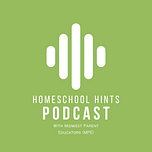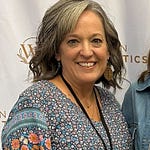TRANSCRIPT
Shanxi: Hello, this is Shanxi Omoniyi, host of MPE’s “Homeschool Hints” podcast to encourage you wherever you may be on your homeschool journey.
Today we're going to be discussing unique learners and their special needs for the conference, which is coming up, and I have with me Suzanne Wandling. She's very much involved with that workshop track of our conference. And so we're going to be talking about some of the exciting things planned this year.
Suzanne, thank you so much for coming on board with me. Is there anything you'd like to share about your homeschooling journey and a little bit about yourself, and how you got involved?
Suzanne: You bet. Well, thanks for having me today, Shanxi. I'm excited to talk about the coming conference and a little bit about myself.
I've been married to my husband, Warren, for almost 30 years. We have two adult daughters that we adore, live in the Kansas City area, and our homeschooling journey started actually with me as an educator. My training is in elementary and special education. I have a degree from the University of New Orleans, and I moved here to go to grad school at KU. Rock Chalk Jayhawk! We love March, right? <laughs>
And so I have a master’s in working with students with learning difficulties as well. And so, I’ve always just been really passionate about helping kids be their best, and so when I was, just had a new baby, my husband and I were in our one-bedroom apartment. We thought, well, what can we do to transition so that I could still work it with kids – which I was really, and still am, very passionate about doing – but then have an opportunity to stay at home with my daughter?
And so we started brainstorming different options and we thought, well, you know, I really like working with families. So I think that families who are homeschooling could really benefit from some resources in special education.
And so I started brainstorming and we thought, well, we're going to need a URL. So we went online and the Internet was just starting, so we have brainstormed and we were thinking and thinking. We thought, well, what if we were homeschoolers.com? So we thought, well, let's check that out and see if it's really a URL that's available because URLs were brand new. People hardly knew what they were, so they were online trying to figure out what they were and purchasing them.
So we went online, and you had to hurry because the Internet was billed by the minute, so we had to hurry, because you had a package and get online and search and it was so interesting. God just flashed out homeschoolers.com, and so that was some time ago. And so we are homeschoolers.com – that's our business – and that's how we got started.
And so I actually started as an educator, so I transitioned from the classroom to the kitchen table, working with other families providing tutoring and support, and then eventually started homeschooling our own kids. And so that's kind of how we got started.
And then currently, I've really discovered, Shanxi, that parents want two things. They want peace and they want confidence. Those are the two things, big things that they're looking for when they're homeschooling their kids with unique needs. And so I've been able to work with families through providing assessments, and then tutoring, and then also coaching and training. So my experience now, even though my children are grown, is really still pouring into families.
Shanxi: So good. Thank you so much for sharing that. So how did you get involved in MPE's unique learners specifically?
Suzanne: Yeah. So I love working with families and helping them, equipping them, because I think if parents are equipped and they know what to do, that takes us back to the confidence piece. And so, I some time ago became a speaker at the MPE conference. And so, my husband actually spoke as well. He's a leadership coach and trainer and so, we helped kids and parents by providing workshops and then I had the awesome privilege of meeting Jean Wetherilt, who's worked with the MPE unique learners track for some time, and she invited me to come on board. And so that's how I got started behind the scenes, helping to put together workshops, and then help support parents as well.
Shanxi: What's been some of the most rewarding parts of that and the things that maybe surprised you along the way?
Suzanne: I think the most rewarding part is when parents have an “Aha” and they say, oh, I can do that. And so, just really sharing something to help encourage them and help them walk away. I think whenever we can just add value to parents by giving them one idea to grow, then they can feel really good about their next step.
Shanxi: Yeah, definitely. So I know I talked with you a little bit before this podcast, and we were talking about what families are looking for these days, especially in families with special needs, and many of them are looking to homeschooling to see, does this fit well with my child's needs? Does it fit well with my particular family situation?
What would you say are some, maybe, red flags to look out for if they think that their child may have special needs. That you know, the child's still very young and they're just kind of testing the waters, so to speak, and they may not want something incredibly expensive, but they also want to be on top of their child's needs and make sure that they're crossing all the t’s and dotting all their i’s and just filling in all the details.
Suzanne: Sure. That's a great question, because often parents don't know some general things that are helpful. Is being curious about your child and how he or she is developing. And so really being consistent with your child's well-child checkups with the pediatrician just to see that they're meeting some of the milestones.
But also, things that parents observe. For example, maybe kids are starting to confuse word order, or maybe you have a kindergartener or a preschooler. You've been singing the alphabet song and it's just not coming like you thought that it would. Or maybe you noticed that a child that's walking on his or her tip toes a lot, and they're not walking in a way that you would anticipate. Or maybe some speech sounds are somewhat developmental and parents don't know, but it's good to check them out. Maybe they're just not making some sounds that they might understand for clear, clear communication.
Shanxi: That's great. That's good to know. And if the child, or if a child is exhibiting some of those red flag behaviors that you mentioned, and the parents are maybe looking for, you know, expert or people to help them along their way. What should they look for in, you know, trying to find someone who can help?
Suzanne: That's a great question. So when you're looking for a professional, the best place to start is with, maybe, your pediatrician, because the pediatrician can put you in the direction of a speech language pathologist, or an occupational or physical therapist.
But when you're looking for a quality provider, sometimes referral from a friend is a really good start, and you could ask a friend that may have had a similar concern. Do they have an idea of a professional to look for? Again, just be really curious and ask a lot of questions of the professionals that you think might be helpful.
Shanxi: That's good advice, especially for, you know, in the homeschooling community, there's often the added pressure of, you know, I'm not going to the school to get these services for homeschoolers in particular. Are there resources in the Kansas City area that you can point them to or maybe suggest to jump start their research, so to speak?
Suzanne: Sure. So I know the MPE website has a great list of resources to get started. And that's a good launching pad if you will. It's interesting that as a homeschooling parent, you're going to want to think about developing a team, if you will.
So if you suspect that your child is struggling, you might start with an educational psychologist or an educational specialist that specializes in assessments with the student, or you might start with an occupational therapist.
If you're having difficulty with hand dominance, for example, you have a 4-year-old and they're still passing their pencil from their left hand to their right. That's something to think about, you know, because at that point in time, they might still be doing that a little bit. But by 4 or 5, they're really considering one hand or what we call hand dominance.
So again, just thinking about well, who would work with hands? Well, occupational therapists work with hands, physical therapist, work with gait and walking well and sensory issues. And then, you know, speech-language pathologists is going to help with communication or articulation difficulties and then, you know, reading specialists like myself or executive functioning, skills like planning and following up, those are the sorts of things I do.
So what you'll want to do is start with one. And then find one professional that you trust and they'll probably be able to recommend others to build a team.
Shanxi: I love that. Yeah. And you don't have to go it alone. It can feel isolating.
Suzanne: For sure.
Shanxi: I just wanted to focus on dyslexia for a second because we get questions all the time from, you know, parents who are thinking my child may have dyslexia, but I'm not exactly sure. How would I go about it?
And then also from your perspective, there are a lot of myths surrounding dyslexia.
Sometimes people might think, oh, they're just being lazy, but there's obviously a lot more happening underneath the surface. Or maybe they'll say the child will grow out of it, or maybe they're just not trying hard enough. Can you speak to some of those myths or common stereotypes surrounding dyslexia?
Suzanne: Sure. And I'm thankful that you brought that up because the more we talk about it, the more parents can realize, oh, I missed that or I see now that really my child has a strength in this area and I lost it because I thought it was, you know, laziness or what have you.
So you know, kids are very excited to learn. And so one of the first signs behaviorally of a child with dyslexia is that they don't want to engage.
So they're going to procrastinate. They're going to appear lazy. So, for example, you know, you want your child to write a sentence, and they're only going to write the first word, or they're going to read half a line instead of a page.
And so it's going to come across that your child doesn't want to, or is distracted, or has better things to do, but your child is trying to develop some coping mechanisms to deal with this stressful situation. They're little people. They don't know what they don't know.
And so the sign of laziness, even in an older student who's maybe in fifth grade, who maybe is newly identified with dyslexia, can be mislabeled as a lazy person. But when they're doing the thing that's hardest for them for half of the day, the fatigue level is very high. The stress can be high, can be anxiety producing.
And so as parents, it's really helpful to look for some of those signs to pull back a little bit, so we don't push their threshold.
I think another one that's really interesting is that you mentioned is that they're going to outgrow it. That someday they're magically going to, they're going to be, have great fluency, they're going to read perfectly and they're going to be able to write incredible sentences.
And sometimes there is the late bloomer, so I don't want to discount that because there are late bloomers that are not dyslexic. At the same time, it's really better to err on the side of caution.
And maybe think about, you know, if your child is in first or second grade and they're not writing a complete sentence by the end of second grade or the beginning of a good paragraph in second grade, you know, that's a red flag, and that's not going to get better without direct instruction.
You know, sometimes we think as homeschoolers, well, I can give you this book. It has all the directions. You should be able to figure it out. And sometimes kids with dyslexia, they just can't. We have to walk them through the process and provide explicit direct instruction to help them.
Shanxi: Good to know, yeah.
Suzanne: Because “I'm trying harder.” If you can imagine trying to learn a new language that you've never experienced, so maybe another country like Asia or something else. Or maybe you've been to France and and you're trying to learn French.
So if you can imagine just presenting a lesson in French and then saying, OK, you should know that. Now you've presented the lesson maybe once or twice. Yes, and you're saying to your student, Well, I think you should know that by now.
Well, no, it just takes a lot of time. And it can be very difficult. And so telling them to try harder, it actually creates anxiety. And when the brain becomes anxious, it actually lapses into fight or flight. And so telling them to try harder is going to make it more difficult. It's not going to create that open mind to be able to learn.
So it's up to us as parents to think, well, what is a different way I can present this information? Or, I wonder if I could provide this information in a multi-sensory way so that they're getting it through hearing and kinesthetic, and different modalities. Might they learn it better?
Shanxi: Yeah, I love that idea of, you know, maybe it's not necessarily the student, it's the method of instruction or the mode of imparting the information.
Suzanne: For sure. Yes, yes, yeah. And I have one more I wondered if I could share.
I've observed one more thing that is really interesting, is that people equate the ability to spell with intelligence. It’s interesting to me. There's no correlation between being able to spell and your intelligence.
In fact, with dyslexia, to be defined as dyslexic, you’re performing, your intelligence is at or above the average level. So you can't be identified dyslexic without average to above-average intelligence. So our culture has identified that if spelling is difficult, you're not smart. And so that is really an important thing for people to weigh.
And so it's really exciting, some of the things that are available in technology to help students now to spell more effectively and write more effectively.
But I think to piggyback on that, let's think how dyslexic children are smart. Or, more accurately, how children with dyslexia are smart. Because they have difficulty in reading or other areas doesn't mean they aren't brilliant problem solvers. They're known to be incredible out-of-the-box thinkers. They have high levels of communication where they can really connect with people in a different way.
Another thing is that they're super resilient because things have been hard at a very young age. They've learned to be super flexible, and so they have a high level of resiliency. And so it's just really interesting, that the perceived weaknesses, but the actual super high strengths, that children with dyslexia have.
Shanxi: Yes, and being able to adapt teaching wise, too, to that out-of-the-box is a great challenge, but it's also a great opportunity too. I love that addition. Thank you so much.
So this year MPE is introducing early screenings at the conference, and this is a new development. Do you want to just tell us, first of all, what is a screening? What can parents expect from this?
Suzanne: Sure. I'm super excited about this opportunity for families. I think they're going to really benefit from this.
A screening is a high-level view of your student in a particular area. Well, let me back up. Let's start with logistics. So they're going to be held at the conference during the conference time. They'll be available on the website to register for particular slots.
The slots available will be speech and language, physical therapy, or occupational therapy. And then reading screenings.
And the reason parents will be excited about this is because, remember, we talked about that confidence piece. Sometimes parents are just unsure where their children are performing in different areas developmentally.
And so when you go to a screening, it's just 10 to 15 minutes long. Again, it's a high-level look at your student. It's not diagnostic. It's meant to say yes, you're hitting the developmental milestones that we anticipate, or, you know, you might benefit from some resources. So why don't you try some of these ideas? And if you find they're not working, let's connect back. Maybe you want to get some more support in this area.
So I think it's going to be great for parents because they're going to be able to get a snapshot of where their kid is performing in a particular area right now. So it's a data point, if you will, Shanxi, just to help families say, yes, we're where we hoped we would be, or, you know what? We have strengths in this area, but we might have some growth opportunities here.
Shanxi: How can parents learn more about the screenings and just everything that's basically follow up. So say, you know, they've gone through, they've done the 10 to 15 minutes like you said, and now they're with the results. Will those be told to them at the time of the screening? Or will there be some follow-up steps?
Suzanne: Yes. So what will happen is they will get the results of the screening right then and there. That's a good question. So thank you for asking that. So it's a very high-level view of particular skills of your student, and so the parent will get feedback. Then if they want more support or if they have more questions, the providers that will be there will have their contact information and they'll be able to follow up.
Shanxi: Yeah. Well, thank you so much for your time. This has been absolutely a joy, just discussing and talking about this issue because I know just from my work with, you know, the website and contact forms, that this is definitely a high-interest topic for a lot of families, especially since 2020 and everything surrounding, you know, IEPs and just…
Let's segue way, if you will, into another question.
Suzanne: Sure.
Shanxi: For parents who, you know, already know that their child has special needs and maybe they're considering homeschooling. How could they best plug into the conference and just other resources available to figure out, you know, whether home schooling is a good fit for them and their child?
Suzanne: The really exciting thing about the way MPE has structured the conference, is there's a whole track of workshops that are designed to help families with unique learners get some more resources and input. And so, the professionals that are hosting those are speech-language pathologists, and reading specialists, and occupational therapists, and so they are experts in their craft. And so when families attend those, they can ask questions, but then they can also ask them for additional resources or opportunities to connect as well.
Shanxi: Come to the conference basically, if you have questions. <laughs>
Suzanne: Yes.
Shanxi: It's something that you know you are wondering about because oftentimes people are like, I must be the only person out there with this problem. <laughs>
Suzanne: Yes. Isn't that the truth, Shanxi? Sometimes when we're homeschooling, it feels really lonely. And that's the benefit of going to the conference because you can connect with other families who may or may not have the same needs, but who are looking just for camaraderie and resources and took a great time to connect with other family.
Shanxi: Yes, right. Thank you so much. And so, when people are out looking for you at the conference, where should they go?
Suzanne: My website is homeschoolers.com, and so there you'll see some resources and some ways to connect, and I do offer brief consults. So on my website, you'll find a place where you can go and check out, and you can sign up for a brief conference. And I'd be happy to connect with you and see if I can't provide some resources for you, to point you in the right direction.
Shanxi: Thanks so much for listening. We hope you are encouraged in your homeschool journey.
Please continue the conversation with us on our website, midwesthomeschoolers.org, or email us at podcast@midwestparenteducators.org. We're also active on social media if you'd like to connect with us there. Thanks to Kevin McLeod of incompetech.com for providing this royalty-free song Wholesome, which is licensed under creativecommons.org.












Share this post